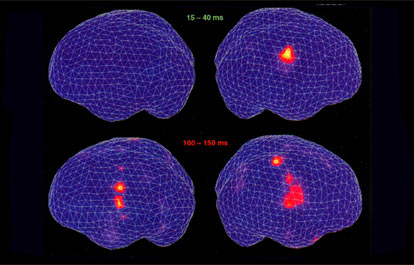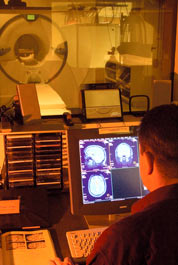

Scientific Lectures //
The Utility of Automated Fiber Quantification in Traumatic Brain Injury Detection
Who: Andrei Vakhtin, PhD, Postdoctoral Fellow Department of Psychiatry & Behavioral Sciences, Stanford University, and War Related Illness & Injury Center, Palo Alto VA
When: Monday, August 26, 2019 at 9:00am
Where: MRN's Large Conference Room (Pete and Nancy Domenici Hall - 1101 Yale Blvd NE)
ABSTRACT: Diffusion tensor imaging (DTI) findings from group analyses of mild traumatic brain injury (mTBI) have been challenging to implement in clinical settings due to diffuse and heterogeneous distributions of damage, data processing requirements, and inconsistent directions of detected effects. This talk presents an application of automated fiber quantification to an mTBI cohort of US Veterans, and discusses its advantages over conventional DTI analyses in terms of spatial granularity, applications to individual data, as well processing times. In addition to traditional DTI metrics, an alternative quantification of white matter tract properties using measures of hemispheric laterality is advanced, which can potentially capture increased within-subject variance levels and circumvent discrepancies in effect directions across study cohorts and individuals.
BIO: Dr. Andrei Vakhtin studied Psychology and Biology as an undergraduate at the University of New Mexico, where he also obtained his Masters of Science and Doctorate degrees in Psychology. He is currently a postdoctoral fellow at the Department of Psychiatry and Behavioral Sciences at Stanford University and the War Related Illness and Injury Study Center (WRIISC) at the Palo Alto VA. His neuroimaging work has utilized multiple modalities, such as (f)MRI, MEG, and DTI, to examine functional brain network dynamics and the white matter pathways that underlie them. Dr. Vakhtin has also investigated the potential of non-invasive brain stimulation to modulate this structure-function balance to improve cognitive function. He is currently involved in DTI-based diagnostics of traumatic brain injury in US Veterans, working directly with healthcare providers at the WRIISC on advancing imaging protocols and analyses with high translational potential.
Feel free to circulate
Light refreshments will be served
Please RSVP to ResearchOps@mrn.org by August 23rd at NOON.

